- Home
- Franz Kafka
The Castle Page 2
The Castle Read online
Page 2
In the second half of the book Kafka chooses to narrate the story largely through conversations and reported speech. As a result, his prose becomes increasingly fluid, culminating in a breathless monologue by a barmaid called Pepi. One can sense the pleasure that he takes in mimicking the envious, spiteful voice of Pepi. And indeed, though a notoriously severe critic of his own work, he himself notes in a letter to Max Brod (September 11, 1922) that he is quite pleased with the last chapters he has written. Yet this uncharacteristic sense of satisfaction does not prevent him from announcing in the very same letter that he is giving up on the book for good. It therefore seems only fitting that the new edition of this unfinished but seminal modern novel should halt, tantalizingly, in mid-sentence. Kafka lifts his pen from the paper, and his words fade into the page.
It is difficult to discuss translation without giving specific examples, which I shall now do. First I shall compare three versions—my translation, the Muirs’, and the German original, in that order—of a central, if rather dense, passage in the novel, in which K. compares the church tower in his hometown with the tower of the Castle:
And in thought he compared the church tower in his homeland with the tower up there. The church tower, tapering decisively, without hesitation, straightaway toward the top, capped by a wide roof with red tiles, was an earthly building—what else can we build?—but with a higher goal than the low jumble of houses and with a clearer expression than that of the dull workday. The tower up here—it was the only one in sight—the tower of a residence, as now became evident, possibly of the main Castle, was a monotonous round building, in part mercifully hidden by ivy, with little windows that glinted in the sun—there was something crazy about this—and ending in a kind of terrace, whose battlements, uncertain, irregular, brittle, as if drawn by the anxious or careless hand of a child, zigzagged into the blue sky. It was as if some melancholy resident, who by rights ought to have kept himself locked up in the most out-of-the-way room in the house, had broken through the roof and stood up in order to show himself to the world.
And in his mind he compared the church tower at home with the tower above him. The church tower, firm in line, soaring unfalteringly to its tapering point, topped with red tiles and broad in the roof, an earthly building—what else can men build?—but with a loftier goal than the humble dwelling-houses, and a clearer meaning than the muddle of everyday life. The tower above him here—the only one visible—the tower of a house, as was now evident, perhaps of the main building, was uniformly round, part of it graciously mantled with ivy, pierced by small windows that glittered in the sun—with a somewhat maniacal glitter—and topped by what looked like an attic, with battlements that were irregular, broken, fumbling, as if designed by the trembling or careless hand of a child, clearly outlined against the blue. It was as if a melancholy-mad tenant who ought to have been kept locked in the topmost chamber of his house had burst through the roof and lifted himself up to the gaze of the world. (Muirs, 12)
Und er verglich in Gedanken den Kirchturm der Heimat mit dem Turm dort oben. Jener Turm, bestimmt, ohne Zögern, geradenwegs nach oben sich verjüngend, breitdachig abschlieβend mit roten Ziegeln, ein irdisches Gebäude—was können wir anderes bauen?—aber mit höherem Ziel als das niedrige Häusergemenge und mit klarerem Ausdruck als ihn der trübe Werktag hat. Der Turm hier oben—es war der einzige sichtbare—, der Turm eines Wohnhauses, wie sich jetzt zeigte, vielleicht des Hauptschlosses, war ein einförmiger Rundbau, zum Teil gnädig von Epheu verdeckt, mit kleinen Fenstern, die jetzt in der Sonne aufstrahlten—etwas Irrsinniges hatte das—und einem söllerartigen Abschluß, dessen Mauerzinnen unsicher, unregelmäßig, brüchig wie von ängstlicher oder nachlässiger Kinderhand gezeichnet sich in den blauen Himmel zackten. Es war wie wenn irgendein trübseliger Hausbewohner, der gerechter Weise im entlegensten Zimmer des Hauses sich hätte eingesperrt halten sollen, das Dach durchbrochen und sich erhoben hätte, um sich der Welt zu zeigen. (Schloβ, 18)
Catching the tone is particularly important in pregnant passages such as this, passages that “foreground” language itself—a term coined by the Linguistic Circle in Prague—with the help of techniques more commonly encountered in poetry than in prose.5 The Muirs’ version of this passage still reads well. Indeed, critics who regard smooth readability as the prime criterion in translation might prefer their version of this passage to mine. My English is stranger and denser than the Muirs’; it is also less vivid than theirs. But then so, too, is Kafka’s German.
In the above passage the Muirs transform the cryptic original into a sermon about the gulf between the human and the divine. The words with which they characterize the church tower—“soaring unfalteringly,” “loftier,” etc.—have spiritual undertones that are more pronounced than those in the original. They also lessen the negative implications of Kafka’s description. In their translation the church tower is “graciously mantled” by ivy—a phrase I render as “mercifully hidden by ivy” (“gnädig mit Efeu verdeckt”). The voice we hear at such moments in the Muirs’ translation is not so much Kafka’s as Brod’s.
Since the Muirs see K. as a pilgrim in search of salvation, they tend to overlook the criticism that Kafka directs at his namesake. I have sought to make K. as calculating and self-serving in English as he is in the original. For instance, in the first chapter Kafka uses the potentially ambiguous phrase “nach seinen Berechnungen” to describe K.’s thinking (Schloβ, 30). The Muirs translate that phrase as “by his reckoning” (Muirs, 23); I render it as “according to his calculations” because I hear in it a covert allusion to K.’s calculating nature. Besides, the phrase may be doing double duty here; it could also refer to the ostensible occupation of K., the surveyor, the would-be professional calculator, who is also calculating (“berechnend”)—a charge, incidentally, that Kafka often leveled against himself.
Like other modernists, Kafka leaves it up to the reader to discern his transitions, which are often hidden under the surface. Sudden changes of tone, even within a single sentence, can catch the reader off guard. Take, for instance, the following sentence, with its puzzling final clause:
He moved about more freely now, rested his stick here and there, approached the woman in the armchair, and was, incidentally, the biggest in the room.
He felt less constrained, poked with his stick here and there, approached the woman in the arm-chair, and noted that he himself was physically the biggest man in the room. (Muirs, 17)
Er bewegte sich freier, stützte seinen Stock einmal hier einmal dort auf, näherte sich der Frau im Lehnstuhl, war übrigens auch der körperlich größte im Zimmer. (Schloβ, 24)
The first three elements describe a sequence of actions and clearly belong together; the fourth clause is in a different category since it describes an attribute of K.’s. The Muirs, in an effort to close this seeming gap in narrative logic, insert an explicit link such as one would find in a nineteenth-century novel—“and noted that he himself”—a linking phrase for which there is no counterpart in the original. As a result, their English sounds more conventional than the German.6
In The Castle the process of interpretation becomes an integral part of the novel. This obsession with meaning is most evident in the second chapter, where K. subjects a six-sentence letter from an official called Klamm—whose name could suggest secretiveness (“klammheimlich”)—to a probing analysis that would satisfy even the most exacting of New Critics. Fittingly, that chapter ends with an explicit reference to interpretation:7
“But you’re spending the night with us,” said Olga in astonishment. “To be sure,” said K., leaving it to her to interpret the words he had spoken.
Unlike the Muirs, who translate the last clause as “leaving her to make what she liked of it,” I have retained Kafka’s explicit reference to interpretation—“und überließ ihr die Deutung der Worte”—because it seems significant in a novel largely made up of K.’s endlessly proliferating interpretations.
Kafka’s prose can also be laco
nically expressive. For instance, when K. attempts to locate Barnabas, his messenger, by shouting his name, we can almost hear the shout:
Nevertheless, with full force K. shouted out the name, the name thundered through the night.
None the less K. yelled the name with the full force of his lungs. It thundered through the night. (Muirs, 36)
Trotzdem schrie K. noch aus aller Kraft den Namen, der Name donnerte durch die Nacht. (Schloβ, 47)
In German the instant repetition of “name” mimicks K.’s yell, an effect I echo in English. Of course it is always possible to quibble with a translator’s solutions. To some ears, my placement of the phrase “with full force” may sound jarring. Yet it is the best compromise I could find. The ideal solution would be to re-create Kafka’s wonderfully elastic syntax without making him sound less natural or more jarring—and he can be both—than he is in German. However, modern English shies away from inversions of word order, and this restricts the options available to the translator. One must simply strike the best balance one can.
Among the many such compromises I would like to single out a couple here. For instance, in the first pages we meet the “Wirt” and “Wirtin.” Initially I experimented with “innkeeper”—the perfect match for “Wirt.” But the “Wirtin” then became “the innkeeper’s wife,” which turned out to be misleading as well as cumbersome. She is no mere appendage to her husband. I therefore decided to use “landlord” and “landlady”—in their older and now infrequent meaning as proprietor of an inn or similar establishment.8
The English-language translator must also grapple with the often conflicting demands of Kafka’s tone and style. Colloquial German, especially in the hands of a master like Kafka, can sound both colloquial and terse. Colloquial English tends to be less succinct. For instance, at the end of the first chapter K. asks his two would-be assistants where they have put their surveying equipment, and they respond: “Wir haben keine.” The translator must choose between a phrase such as “We have none,” which captures the terse style of the original but introduces an inappropriately wooden tone, and the tonally accurate but somewhat less pithy English “We don’t have any.” In that particular case I selected the latter; at other times I chose less colloquial language in order to echo Kafka’s terseness.
While Kafka generally plays off lofty and down-to-earth diction in his usual contrapuntal fashion, sometimes he simply piles one on top of the other. At such moments the translator must choose between preserving the tone and capturing the interpretative nuances under the surface. A simple instance: at one point K. tells the villagers that they have “Ehrfurcht” for the authorities. While that word could mean something as lofty as “reverence” or even “awe,” it can also be used in a more everyday sense, simply as “respect.” The translator is obliged to choose between the colloquial and elevated tones. I hesitated a long time, since that particular choice could affect how readers interpret the mysterious Castle. Yet in the end I opted for the less lofty term “respect.” The word “Ehrfurcht” occurs several times in the same conversation, and to have the characters speak repeatedly of “reverence” or “awe” seemed tonally inappropriate.
Punctuation is another thorny issue. In Germany some critics objected to Kafka’s frugal use of punctuation in Das Schloβ, which Malcolm Pasley respected in the critical edition. One could reasonably argue that Kafka might have gone through the manuscript and inserted conventional punctuation had he prepared the text for publication. Yet, as a diary passage of 1911 suggests, he was highly conscious of the impact punctuation—or its absence—can have on listeners:
Omission of the period. In general the spoken sentence starts off in a large capital letter with the speaker, bends out in its course as far as it can towards the listeners and with the period returns to the speaker. But if the period is omitted, then the sentence is no longer constrained and blows its entire breath at the listener.9
The paragraphs in The Castle are extraordinarily long even by the standards of literary German. At the risk of trying the patience of English-speaking readers, I decided to retain them. For one thing it would be difficult to break up the paragraphs without making arbitrary decisions about which portions of dialogue to print in separate paragraphs and which to leave in the narrative. Besides, Kafka’s decision to embed the dialogue in the narrative and to omit most punctuation except for commas and an occasional period lends his prose a breathlessly modern tone.
The relentless momentum of Kafka’s prose in The Castle was not lost on Samuel Beckett. In a rare 1956 interview with a journalist from the New York Times Beckett had the following to say about Kafka’s style: “I’ve only read Kafka in German—serious reading—except for a few things in French and English—only The Castle in German.… You notice how Kafka’s form is classic, it goes on like a steamroller—almost serene.”10
Kafka himself could not always tell where his words would lead him: “Where, then, shall I be brought?”11 he asks himself in the diaries not long before sitting down to write The Castle. That is a question that we, too, constantly ask ourselves. Although we are often unsure what is happening in the strange world of the village and the Castle, Kafka holds us in thrall through a startling combination of breathless intensity and ironic—and at times even drily humorous—detachment.
MARK HARMAN
Notes
I should like to thank Lina Bernstein and David Kramer for graciously hosting readings from the translation-in-progress, and other participants—too numerous to name individually—whose responsiveness spurred its gestation. I am especially indebted to David Kramer’s keen ear and linguistic acumen. A grant from the Austrian Ministry of Education and Art provided needed support for the translation. I am also grateful to Fred Jordan, who gave the original commission, to Melanie Richter-Bernburg for her fruitful suggestions and patience with my many revisions, and to Arthur Samuelson, who supported the project and shepherded it into print.
A related essay “Digging the Pit of Babel: Retranslating Franz Kafka’s Castle,” which appeared in New Literary History 27, no. 2 (1996): 291–311, and also, in somewhat different form, in Lenore A. Grenoble and John M. Kopper, eds., Essays in the Art and Theory of Translation (Lewiston, N.Y., 1997), 139–64, contains a more complete bibliography than can be included here.
1. W. H. Auden, “Lame Shadows,” in Forewords and Afterwords, selected by Edward Mendelson (New York, 1973), 404.
2. Edwin Muir, The Structure of the Novel (London, 1928), 127.
3. S. S. Prawer, “Difficulties of the Kafkaesque,” Times Literary Supplement, October 14, 1983, 1127–28.
4. See Kafka’s letter about Walser in Mark Harman, ed., Robert Walser Rediscovered: Stories, Fairy-Tale Plays, and Critical Responses (Hanover, N.H., 1985), 139–40.
5. The term “foregrounding” was developed by the Prague Linguistic Circle only a few years after Kafka’s death. See Jan Mukarovsky, “Standard Language and Poetic Language,” in A Prague School Reader on Esthetics, Literary Structure, and Style, ed. Paul L. Garvin (Washington, D.C., 1964).
6. In German this sentence sounds more convincing if one reverts to Kafka’s initial wording and reads it in the first person. However, that is an isolated instance. Usually, the lingering presence of that erased yet still audible “I” makes K.’s voice all the more compelling. For a comparable phenomenon in Robert Walser, see Mark Harman, “A Secretive Modernist: Robert Walser and his Microscripts,” in Review of Contemporary Fiction 12, no. 1 (1992): 114–17.
7. Around the time Kafka was writing the “letter chapter” in The Castle, he confided the following to Milena Jesenská: “All my misfortune in life … derives from letters or from the possibility of writing letters” (late March 1922). Kafka, Letters to Milena, trans. Philip Boehm (New York, 1990), 223.
8. Another possibility I considered for “Wirt” and “Wirtin” was “proprietor” and “proprietress”; however, they are too Latinate and emphasize possession in a way that Kafka—who could have chosen
the German equivalents, “Inhaber” and “Inhaberin”—does not.
9. Franz Kafka, Diaries 1910–1923 (New York, 1988), 45.
10. New York Times, May 6, 1956, 25.
11. Kafka, Diaries, 399.
I.
ARRIVAL
It was late evening when K. arrived. The village lay under deep snow. There was no sign of the Castle hill, fog and darkness surrounded it, not even the faintest gleam of light suggested the large Castle. K. stood a long time on the wooden bridge that leads from the main road to the village, gazing upward into the seeming emptiness.
Then he went looking for a night’s lodging; at the inn they were still awake; the landlord had no room available, but, extremely surprised and confused by the latecomer, he was willing to let K. sleep on a straw mattress in the taproom, K. agreed to this. A few peasants were still sitting over beer, but he did not want to talk to anyone, got himself a straw mattress from the attic and lay down by the stove. It was warm, the peasants were quiet, he examined them for a moment with tired eyes, then fell asleep.
Yet before long he was awakened. A young man in city clothes, with an actor’s face, narrow eyes, thick eyebrows, stood beside him with the landlord. The peasants, too, were still there, a few had turned their chairs around to see and hear better. The young man apologized very politely for having awakened K., introduced himself as the son of the Castle steward and said: “This village is Castle property, anybody residing or spending the night here is effectively residing or spending the night at the Castle. Nobody may do so without permission from the Count. But you have no such permission or at least you haven’t shown it yet.”

 Diaries of Franz Kafka
Diaries of Franz Kafka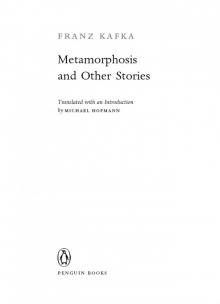 Metamorphosis and Other Stories
Metamorphosis and Other Stories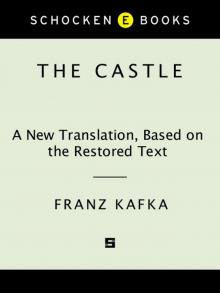 The Castle: A New Translation Based on the Restored Text
The Castle: A New Translation Based on the Restored Text The Complete Stories
The Complete Stories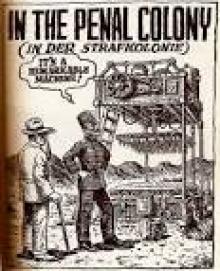 In the Penal Colony
In the Penal Colony The Trial
The Trial Amerika
Amerika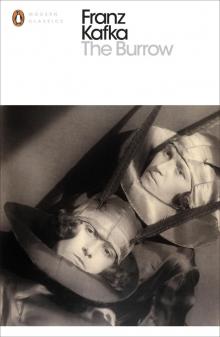 The Burrow: Posthumously Published Short Fiction
The Burrow: Posthumously Published Short Fiction Sons
Sons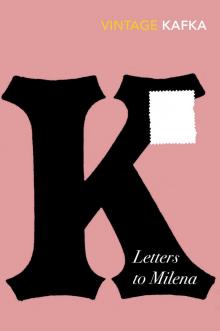 Letters to Milena
Letters to Milena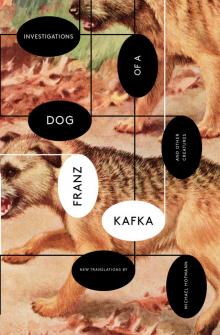 Investigations of a Dog: And Other Creatures
Investigations of a Dog: And Other Creatures Collected Stories
Collected Stories The Great Wall of China
The Great Wall of China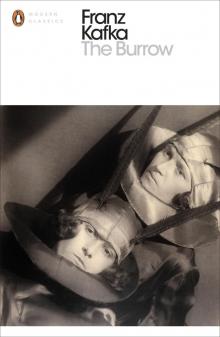 The Burrow
The Burrow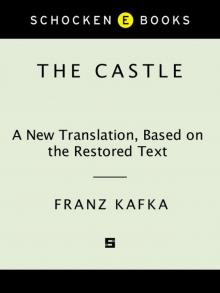 The Castle
The Castle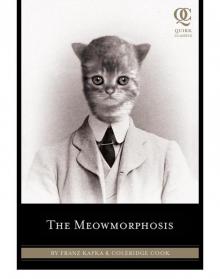 The Meowmorphosis
The Meowmorphosis The Sons
The Sons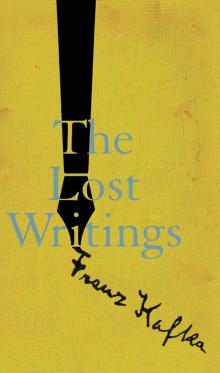 The Lost Writings
The Lost Writings The Unhappiness of Being a Single Man
The Unhappiness of Being a Single Man Amerika: The Missing Person: A New Translation, Based on the Restored Text
Amerika: The Missing Person: A New Translation, Based on the Restored Text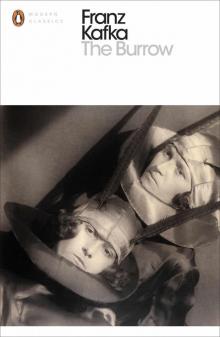 The Burrow: Posthumously Published Short Fiction (Penguin Modern Classics)
The Burrow: Posthumously Published Short Fiction (Penguin Modern Classics) The Diaries of Franz Kafka
The Diaries of Franz Kafka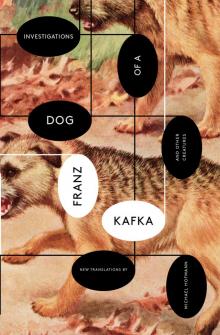 Investigations of a Dog
Investigations of a Dog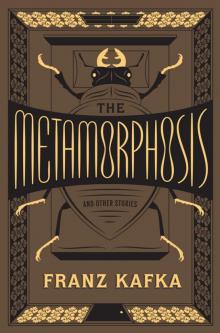 The Metamorphosis and Other Stories
The Metamorphosis and Other Stories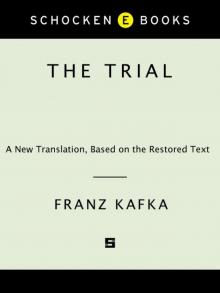 The Trial: A New Translation Based on the Restored Text
The Trial: A New Translation Based on the Restored Text